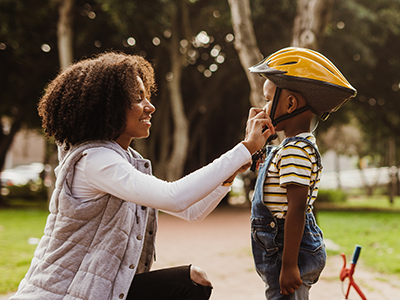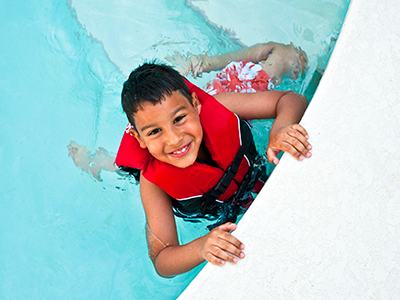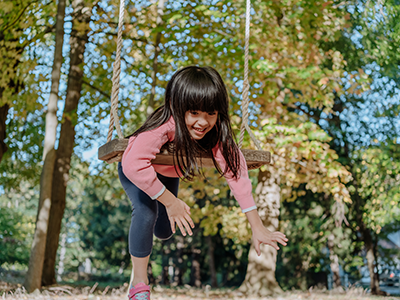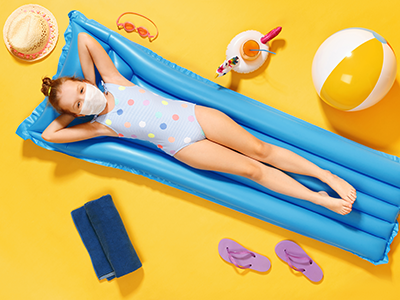As we head into July, it’s time to endure hotter temperatures, thicker humidity and more time spent by the water’s edge. Unfortunately, all three of these summer conditions tend to lead to another thing: bug bites.
All bugs, especially mosquitoes, tend to start showing up at your seasonal cookouts when the temperature rises to 50 degrees or higher, and become even more prevalent the hotter it gets.
In fact, back in April, Washington, DC was listed as the third city among metro areas with the worst mosquito problem in the nation by the pest control company Orkin’s annual rankings.
To better prepare you for the growing infestation and inevitable bites your children will receive, Dr. Kirkorian of Children’s National shares her tips for how to handle the peak of bug season.
Talk to me about recommendations for bite prevention.
I think a few common-sense things that parents should know would be to avoid high times like dusk hours, don’t have standing water in your garden in places that will attract mosquitoes and wear as much clothing as possible during this increasing humidity that’s crazy in Northern Virginia. Insect repellent is just a must. You can also certainly input plants in the garden that repel mosquitoes or use candles, but certain children just attract mosquitoes. In a family with five kids, one kid is bound to get bit.
Do children tend to react differently to bites than adults?
One thing that people should know is that children are much more likely to get something called exaggerated insect bite hypersensitivity, but it just means crazy big bites. Instead of getting a normal little red bite, they’ll get huge welts or blisters and parents get very overwhelmed. For the most part, this has nothing to do with an infection; your immune system just goes haywire at a bug bite and it’s very common to see in childhood – infancy through school age – and then seems to wear off. Readers should definitely be aware of that because it’s a common problem.
And then with the one kid who is the insect magnet, you need to monitor that. Whether that be having him do more indoor activities, wearing more layers or something else. You have to modify the behavior because we can’t get rid of bugs on this earth, especially in our area. In the summer months, when you know it’s worse, you have to do your best to reduce possibilities of exposure.
Have you found any organic, preventative products that work as well as chemical-based repellents?
Well, the CDC approves three bug spray ingredients: DEET, Picaridin and oil of lemon eucalyptus (OLE). You could call oil of lemon eucalyptus organic or natural, for sure. But you have to keep in mind that mosquitoes aren’t just itchy, they also have risks because they can carry diseases. The CDC does not recommend the use of homeopathic products that you hear about on the internet because you can get really sick if the product doesn’t have any of the three ingredients. You can certainly also use the other quote-unquote natural things, like tea tree oil, in addition to the three ingredients, but from the medical standpoint I can’t recommend anything other than what the CDC does.
Are there any common issues you’ve noticed since the summer began that parents should be aware of?
It always happens that our bug bite visits pick up in late spring and then wind down, and it’s usually mosquitoes. One thing I always tell patients is that I can’t tell what bug bit you based on a skin reaction, but I can make educated guesses based on where the bite is. We do know that mosquitoes are around primarily in the warmer temperatures and that’s the main difference, especially because some kids get these really, really bad reactions.
Also in people of color, kids can get post inflammatory hyperpigmentation, so basically brown marks from the bug bite, which can last days and months. It’s really all about prevention and trying to avoid the bug bites in the first place – that’s key. I’ve noticed that there’s been more mosquitoes this summer, but that’s me speaking as a parent and as a human who lives in DC, mostly because it’s been one of the most-wet years we’ve ever had.
Is there anything specific parents should apply to children’s skin when they have a bad reaction to a bite?
They can use over-the-counter anti-itch products, such as Sarna sensitive or calamine lotion, or aloe vera. If really severe, they should see their pediatrician or dermatologist and we can prescribe a topical steroid that can help with the itch and inflammation.
This blog post originally appeared in Northern Virginia Magazine online.
 https://riseandshine.childrensnational.org/wp-content/uploads/2025/09/parent-hugging-child-feature.jpg
300
400
Danielle Robbins
https://riseandshine.childrensnational.org/wp-content/uploads/2017/11/childrens_riseandshine_logo.jpg
Danielle Robbins2025-09-22 11:04:052025-09-22 11:04:05Reunited and it feels so good: Getting your family back together after disasters and emergencies
https://riseandshine.childrensnational.org/wp-content/uploads/2025/09/parent-hugging-child-feature.jpg
300
400
Danielle Robbins
https://riseandshine.childrensnational.org/wp-content/uploads/2017/11/childrens_riseandshine_logo.jpg
Danielle Robbins2025-09-22 11:04:052025-09-22 11:04:05Reunited and it feels so good: Getting your family back together after disasters and emergencies





















Leave a Comment
Want to join the discussion?Feel free to contribute!